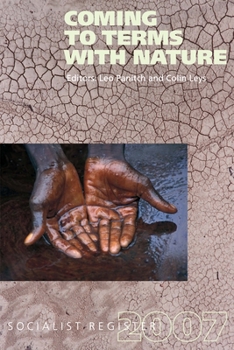Coming to Terms with Nature: Socialist Register 2007
(Book #2007 in the Socialist Register Series)
Since 1964, the Socialist Register has brought together leading writers on the left to investigate aspects of a common theme. Coming to Terms with Nature: Socialist Register 2007 examines whether capitalism can come to terms with today's ecological challenges and whether socialist thought has developed sufficiently to help us do so. Topics include: the ecological contradictions of capitalist accumulation and the growing social conflicts...
Format:Paperback
Language:English
ISBN:1583671528
ISBN13:9781583671528
Release Date:November 2006
Publisher:Monthly Review Press
Length:216 Pages
Weight:1.25 lbs.
Dimensions:1.1" x 6.3" x 9.1"
Customer Reviews
2 ratings
Envisioning real environmental and social justice
Published by Thriftbooks.com User , 17 years ago
"Coming to Terms with Nature: Socialist Register 2007" by Leo Panitch and Colin Leys (Editors) delivers a high-quality anthology about the contemporary environmental crisis. The seventeen articles are written by leading thinkers associated with the socialist movement. Collectively, the articles make it clear that capitalism's perpetual growth imperative cannot help but push the world towards environmental catastrophe; yet the authors also guide us towards envisioning real environmental and social justice in which the sustainable production of goods and services for the benefit of all people may be attained. A key line of criticism shared by several authors pertains to inequality and environmental destruction. Brenda Longfellow discusses how global warming is driven by a fossil-fuel based economy controlled by large corporations but whose costs are most immediately felt by the poor. In a similar vein, Achim Bunnengraber argues that the Kyoto Protocol has merely shifted polluter responsibility around and can only succeed in delaying a real solution to the problem of CO2 emissions. Neil Smith describes how environmental legislation is often designed to allow short-sighted decision making to persist as nature is transformed into a tradable commodity. Henry Bernstein and Philip Woodhouse' article on Africa shows how the powerful continue to exploit the continent for profit, resulting in the exhaustion of land resources and increasing deprivation and exclusion for the poor. A number of thoughtful articles link economic theory with the environment. Joan Martinez-Alier relates Marx's theories pertaining to uneven development with the routine practice of wealth extraction from peripheral nations for the benefit of capitalist power centers. Daniel Buck punctures the idea that environmental catastrophe might somehow lead to systemic breakdown, arguing that capitalism is principally a means of social organization that tends to thrive on crisis. However, Costas Panayitakis theorizes that consumerism represents a particularly harmful form of capitalism that cannot be sustained indefinitely. The subject of greenwashing is addressed by several contributors. Jamie Peck shows how the Heritage Foundation played a major role in framing media coverage of the New Orleans reconstruction controversy and help win public approval for the Bush administration's neoliberal policies. Heather Rogers believes that public relations campaigns have succeeded in obscuring corporate responsibility and inscribing an erroneous belief that individuals are the principle source of the pollution problem. Political struggle is discussed in Barbara Harriss-White and Elinor Harriss' article on the nuclear energy industry's successful attempts at minimizing renewable energy policy in the U.K. Frieder Otto Wolf reflects on the difficulty that the German Green Party has had in reconciling theory with practical politics. Philip McMichael discusses how food policies allow agribusiness to cl
Coming to Terms is a solid keenly whetted reader
Published by Thriftbooks.com User , 17 years ago
Edited by Leo Panitch & Colin Leys, Coming to Terms with Nature: Socialist Register 2007 is an anthology of essays by learned authors discussing the dramatic ecological challenges to capitalism today, and whether socialist thought has progressed sufficiently to address capitalism's weakness in this regard. Writings include "China: Hyper-Development and Environmental Crisis", "Neoliberal Hurricane: Who Framed New Orleans?", "Africa: Eco-Populist Utopias and (Micro-) Capitalist Realities", and much more. It should be noted that "Coming to Terms with Nature" is not a wholesale attack upon capitalism, nor a blind sermon on the mount extolling the virtues of socialism; the purpose here is to explore the failings of each system in addressing serious social and environmental problems, and thereby pave the way for more effective solutions. From smokescreen attacks against "litterbugs" that fail to question the overproduction and overpackaging that contributes to litter and landfills, to so-called "green capitalism" that too often fails to meet the mark of being truly ecologically sustainable, to the significance of the impasse concerning the Kyoto protocol, Coming to Terms is a solid keenly whetted reader, offering eye-opening perspectives to ecological issues long in the making.





